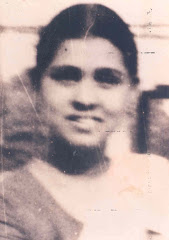By A.C. Snow, Correspondent, 19 June 2011, News & Observer, Raleigh, North Carolina, USA.
I SUPPOSE it's only natural that on every Father's Day, while not consciously meaning to, I revisit my father, that is, the memory of him.
Also, every Father's Day, I re-evaluate my own performance as a father.
I am even tempted from time to time to call my daughter and ask in what ways I failed or disappointed her as a father. But I usually back off, knowing that she loves me too much to be totally honest. Anyway, I'm not looking for an "A." A pass-fail grade will suffice.
Surely, many of you have experienced that same temptation and warned yourself, "Don't go there!"
Although I'm not complaining or blaming him, it was almost as if I never had a father, at least not in the way that today's kids interact and enjoy their dads.
Dad was 64 when I was born, already around the bend of his life's road. Because I was the youngest of his 10 sons, he had little energy for or interest in me.
I can't recall him ever holding me in his arms. I never heard "I love you," from him, which was not that unusual for those times when the expression was pretty much nonexistent in father-son relationships.
Something missing
A friend once told me that he only heard his father say "I love you" once during his lifetime.
As a little boy, he was playing in the yard when his father accidentally ran him down with a riding lawn mower, breaking his arm.
The distraught father, picked him up in his arms and blurted, "I love you! I love you!"
"It was wonderful!" he said. "Those words were well worth the pain."
In a recent "All in the Family" rerun, overbearing Archie is visiting daughter Gloria in the hospital after she has miscarried her and Meat head's first baby.
Archie sits by his daughter's bed, staring at her, overcome by emotion.
"Daddy, are you trying to say something?" Gloria asks gently. Archie silently nods his head.
"Are you trying to say 'I love you?'" Gloria asks.
Archie, his eyes welling, again nods in the affirmative, whereupon his daughter says softly, "I love you, too, Daddy."
He did care
How great it is that those three powerful words, "I love you," seem so much easier for today's fathers when interacting with their sons.
My father was a good man, a gentle man. It wasn't his fault that I spent most of my youth vainly looking for a father figure.
He was never abusive, either in word or action toward his children. Although I sometimes thought that even negative attention would be better than no attention, I now can't imagine anything more traumatic or tragic for a child than growing up with an abusive father.
In his book, "Dear Dad: Letters from an Adult Child," comedian-author Louie Anderson described with poignancy the pain of living with an alcoholic father and the emotional scars he endured.
In this collection of bittersweet letters written to his dead father, he mentions the time when he saw a $4.88 toy car in a store and asked his father for it. His dad told him he couldn't afford it, then promptly bought a $5 case of beer.
Anderson said one of the few times he ever embraced his father was when he was helping him to the bathroom as he was dying of cancer.
"Just holding you up, I knew, was enough," he wrote. " It was all I ever wanted ... and as I held you, I remember thinking, 'I won't let you down, Dad. I won't let you down.'"
How did I do?
Some tension between parent and child is normal. Friends with sons tell me that's especially true during the teen years.
As the father of two daughters, I came to realize that granting them freedom as they move from childhood into the uncertain, dangerous terrain of adulthood without being judgmental is a major challenge for any parent.
My wife, recently sifting through and discarding items from one of several boxes marked "Don't throw away!" came across a very wise observation by Khalil Gibran, Lebanese-American author of "The Prophet:"
Your children are not your children.
They are the sons and daughters of Life's longing for itself. ...
And though they were with you, yet they belong not to you. ...
You may house their bodies but not their souls,
For their souls dwell in the house of tomorrow, which you cannot visit, not even in your dreams. ...
This past week, I finally succumbed to that nagging temptation to ask "Honey, how did I do?"
"In what way did I most disappoint you as a father?" I nervously asked at the end of telephone conversation.
Without a moment's hesitation, she replied, "I never had a pony."
I could hear the humor in her voice.
You may email Mr. A.C. Snow at ac.snow@newsobserver.com or
if you're in the US, please call him on 919-836-5636.
Sunday, September 25, 2011
Subscribe to:
Comments (Atom)

